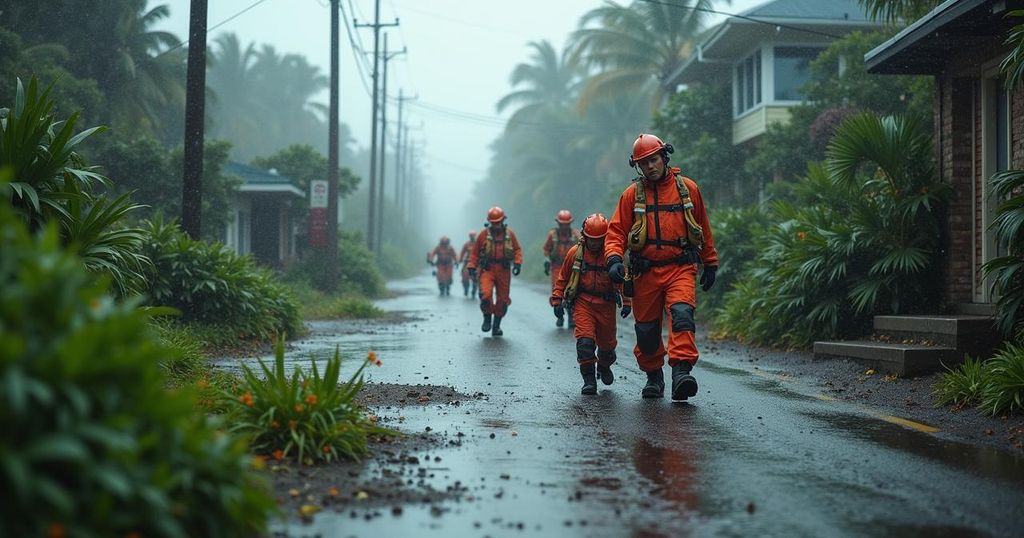The Devastating Aftermath of Hurricane Helene: Missing Persons and Rising Death Toll in North Carolina

North Carolina faces an escalating crisis in the wake of Hurricane Helene, with 115 confirmed deaths and numerous individuals reported missing. The state is coordinating efforts to assess the full scope of the disaster, and misinformation complicates recovery operations. Volunteer efforts to track missing persons have reported over 1,400 individuals unaccounted for. The situation remains urgent as communities attempt to rebound from the severe flooding and destruction caused by the storm.
In the aftermath of Hurricane Helene, North Carolina authorities are still working to determine the number of individuals reported missing. With a total of 115 confirmed storm-related deaths across the state, which has the highest death toll among the southeastern states affected by the storm, local officials are grappling with the scale of the disaster. The North Carolina Department of Health and Human Services has been coordinating with various agencies to compile data on missing individuals and welfare checks but has not yet provided an accurate count. Early estimates from the White House suggested that the number of missing might be as high as 600 across several states. In Buncombe County alone, Sheriff Quentin Miller indicated that over 200 people remain either missing or stranded, particularly around the devastated city of Asheville. Governor Roy Cooper emphasized the severe impact on entire communities within the Blue Ridge Mountains and reported that some regions have experienced over two feet of rainfall. The North Carolina authorities acknowledged that there are ongoing efforts to confirm additional deaths that may be linked to the storm. Other states reporting fatalities include 49 deaths in South Carolina and smaller tallies in Georgia, Florida, Tennessee, and Virginia. In terms of missing persons, volunteer Ellie Erickson has compiled a Google spreadsheet that lists 1,412 people reported missing, a task she undertook following another disaster in 2022. The information she has gathered includes cases from North Carolina and other impacted states such as Florida and Tennessee. Individual families are advocating for their loved ones, like the family of Kim Ashby, a teacher who was possibly swept away by floodwaters, and John Norwood, who has not seen his fiancée since a roof collapse. Sheriff Miller reassured the public that recovery efforts remain relentless, stating, “Our search and recovery has not ceased. We’ve been trying to do that 24/7. We cannot stop. We must continue to move forward.” Additionally, misinformation regarding the disaster has hindered recovery efforts, as Buncombe County officials reported false claims circulating on social media that create substantial obstacles to effective coordination. Federal officials, including FEMA’s chief, acknowledged that the levels of misinformation surrounding the storm are unprecedented. Hurricane Helene made landfall as a Category 4 storm in Florida on September 26, causing heavy rains and significant flooding as it moved northward through several states. Thousands of roads remain impassable, severely disrupting aid efforts, and approximately 50,000 residents in North Carolina continue to experience power outages.
Hurricane Helene significantly affected several southeastern states when it made landfall, causing extensive flooding and damage, particularly in North Carolina. The storm led to a tragic loss of life with many residents reported missing. The scale of the disaster has prompted local and federal agencies to mobilize extensive search and recovery efforts, amidst challenges posed by misinformation regarding the situation. The impact of the storm also led to infrastructure damage, leaving many residents stranded and in need of assistance, which has heightened the urgency of relief efforts.
In conclusion, the aftermath of Hurricane Helene remains dire, particularly in North Carolina where officials are struggling to account for missing persons amid a rising death toll. The coordination of recovery efforts is critical as misinformation hampers rescue operations. Families continue to seek answers for their missing loved ones, urging for a sustained and focused recovery approach.
Original Source: www.forbes.com






